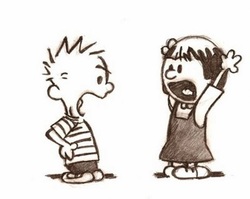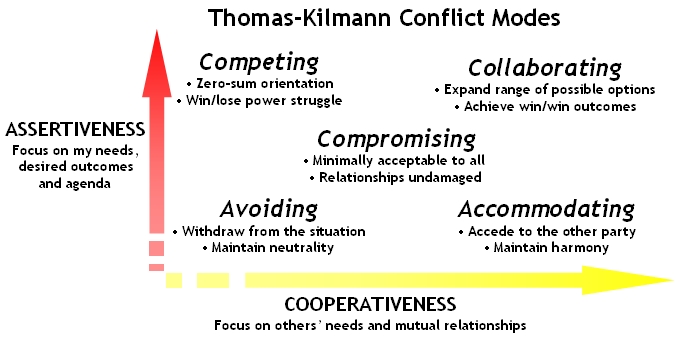 You thought I meant cancer? Nope, not a doctor and not qualified to tell you much on that, but I do know a thing about another unpleasant big "C" - CONFLICT. And conflict can sometimes feel like a cancer if we let it. But conflict in and of itself isn't a bad thing. Just like cancer is our own cells that mutate, now there are things we can do that contribute to it, but it can also just happen. Same thing with conflict. A conflict is simply two interdependent parties having different goals or needs. Sounds pretty benign, right? It is. And it's also very normal! And inevitable! If we all wanted and needed the same things all the time, this would be quite a boring world with a LOT of boring similar people with boring lives and little innovation or excitement. “Conflict is an expressed struggle between at least two interdependent parties who perceive incompatible goals, scare resources, and interference from others in achieving their goals.” The reason a conflict can begin to feel like a cancer eating at us or damaging relationships over time is because of the way we choose to handle it! Most of us have a dominant response to conflict situations that we tend to automatically use in most conflicts without putting much choice or thought into our reaction. This dominant response is not going to be the best choice in all situations. But with a little awareness, and a few tips and tools we can become more aware of what our options are and therefore consciously choose a better way to navigate a conflict. This is a subject that can and has been studied and written about at length and I won't claim to give you the cure all in just a few paragraphs. I will however share a few things for you to consider to aid you in changing your mindset about conflict and therefore how you engage in future conflicts. One of the first things I want to point out that is evident in our definition above, is that there are two parties involved...in other words both have some contribution. In every conflict each party has some ownership. Even if you know you are right, maybe the way you make your point is contributing to the conflict, maybe even though your intentions were good, they were mistaken. However big or small, each party has contributed. Being honest with yourself and owning your contribution is a great first step in resolving issues. On the path to self awareness and choosing how to respond to various conflict situations, we first need to know what our autopilot response tends to be in these situations. A good tool for figuring that out is the Thomas-Killman Conflict Mode Instrument. It will tell you which of the five conflict styles you use most frequently. The graphic below shows the five styles and provides explanations for each and when it is best to use which style. Once we are aware of our own usual style and become familiar with our other options, we can then move toward a more deliberate and constructive manner of handling conflicts. Let me give some examples that may help explain this graphic a little better... In every conflict there are two parts, the content and the relationship. So another way we can interpret this scale is by thinking of "cooperativeness" as the importance of the relationship, and "assertiveness" as the content/issue at hand. We need to evaluate both factors in each situation and use our conclusions as the information we need to choose which style. For example, if I am experiencing a difference of opinion about where to go to dinner with my loved one and he really has his heart set on Italian but I suggested Chinese, depending on how important it is to me that I get to eat Chinese food that night and how important maintaining a positive relationship is to me, I have a few choices...I could be competing and "win" with Chinese because it is super important to me. Or I could be accommodating because I like both and I can see he really wants Italian tonight and I want to maintain the relationship. So if I care more about us spending time together that night than what we actually eat, accommodating is my best choice. However, if I choose competing just because I want to "win" not because the issue was that important, that can be an indicator of something more going on. So part of this process is evaluating why we want what we want. What is driving my position?
Now that was a pretty simple example to illustrate that conflicts can be pretty complex, even the simple ones... The point of this is to get you thinking about your options. It is not that one style is better always than others, although collaboration does have an edge because both parties are getting needs met, there are certainly situations where each style is appropriate. Games wouldn't be as fun without competition! And what if a person threatens to kidnap your child, I would hope you would choose competing because the issue is too important! If a person is running after me to cause me harm, you better bet I'm avoiding! Like some cancers, the outcome of a conflict can depend on when you address it and how you treat it. Being proactive, aware and knowing your options can help! Sorry it's a long one! Continue the discussion in the comments if you will! What is your dominant response? How's that working out for you? How can I help?
1 Comment
|
Anna OlsonThis is where I share resources, tips and nerd out on communication and leadership. Archives
March 2016
People I FollowJon Acuff Categories
All
|


 RSS Feed
RSS Feed
